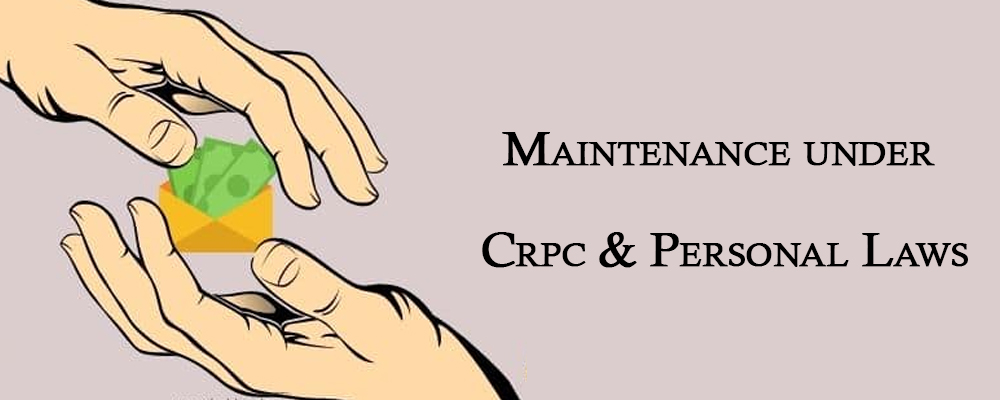The Indian Legal system has various personal and secular laws which govern the law of maintenance. Here are some of the laws which talks about maintenance.
Laws about Maintenance:
- Hindu Marriage Act and & Hindu Adoption & Maintenance Act for Hindus
- Muslim Women (Protection of Rights on Divorce) Act, 1986 for Muslims
- Parsi Marriage and Divorce Act,1936 for Parsis
- Divorce Act, 1869 for Christians
- Criminal Procedure Code & Special Marriage Act are secular laws
Maintenance under Criminal Procedure Code:
Section 125crPC contains provisions of maintenance for the following people in the condition that they are unable to maintain themselves:
- Wife including divorced women
- Minor children, including illegitimate
- Disabled major children, but not the married daughter
- Parents
Where it can be filed:
Application can be filed before Judicial Magistrate First Class where the husband, wife together resided or presently the wife resides. Here maintenance can be claimed by the wife along with children. The magistrate can order interim maintenance during the pendency of the proceedings
Maintenance Under Domestic Violence:
It is a civil law which was enacted to protect women from domestic violence. Section 20 Domestic Violence Act talks about the monetary relief granted to the aggrieved women and her children for the loss suffered due to domestic violence.
Where it can be filed:
The application can be filed u/s 12 read with section 20 of DV Act can be filed before judicial magistrate/ Metropolitan Magistrate and the judge can order interim maintenance during pendency of proceedings if it is satisfied that there is a prima facie case in favour of the aggrieved person. The magistrate may pass ex-parte order basis the income affidavit in the absence of the respondent
Overlap Between DV & 125 CrPC:
Proceedings under both Acts are independent of each other. However, while deciding the maintenance under DV, maintenance under CrPC shall be kept in mind. The court either maintains the same status or enhances the maintenance. Aggrieved Women after getting the order of maintenance can claim additional reliefs under Domestic Violence Act.
Supreme Court in landmark case of Juveria Abdul V. Atif Iqbal held that monetary relief as stipulated u/s 20 are different from the maintenance which can be in addition to maintenance order u/s 125 CrPC
Need A Legal Advice
The internet is not a lawyer and neither are you. Talk to a real lawyer about your legal issue

Maintenance under Hindu Laws:
Section 18 of the Hindu Adoption and Maintenance Act, 1956 talks about the maintenance of the wife by the husband. For the purposes of this Section, the term wife does not mean a divorced wife i.e. this section only applies to the married wife. The Husband is obliged to maintain her even if she is living separately from him, if such separation is justified under any of the reasons given under this particular Section. This Section is also gender biassed.
Whereas, the provision for maintenance under Section 25 of the Hindu Marriage Act, 1955 stands on different grounds. Under this Section, either of the spouse i.e. husband or wife can claim maintenance. Either of the parties may apply to the Court for maintenance. Though, the factors for deciding whether a person will receive maintenance or not, is gender-specific. This means that for women, the parameters are different from that for men.
Maintenance under Muslim Law:
The Muslim Personal Law only mandates that the husband shall maintain his wife, and not the divorced wife. Post divorce, he only requires to maintain her for the Iddat period. Usually, the payment of dower is only considered to be enough maintenance for the wife.
There are various differences in the laws of maintenance as given under the various personal laws as well as in the secular laws of CrPC. Talk to lawyers at Lead India and they will help you and makes you understand the importance of personal and secular laws, if you ask legal question then they tell you about that, and which law is applicable to you when you ask him for a free legal advice.





 Talk to a Lawyer
Talk to a Lawyer